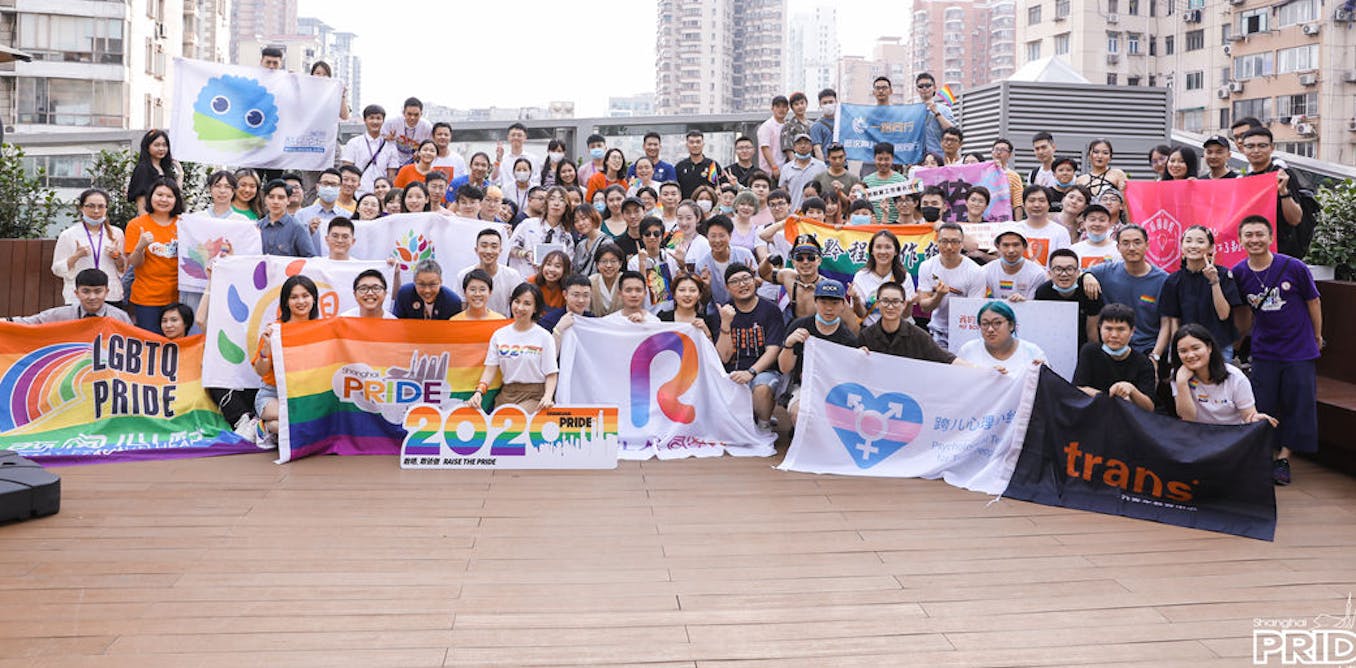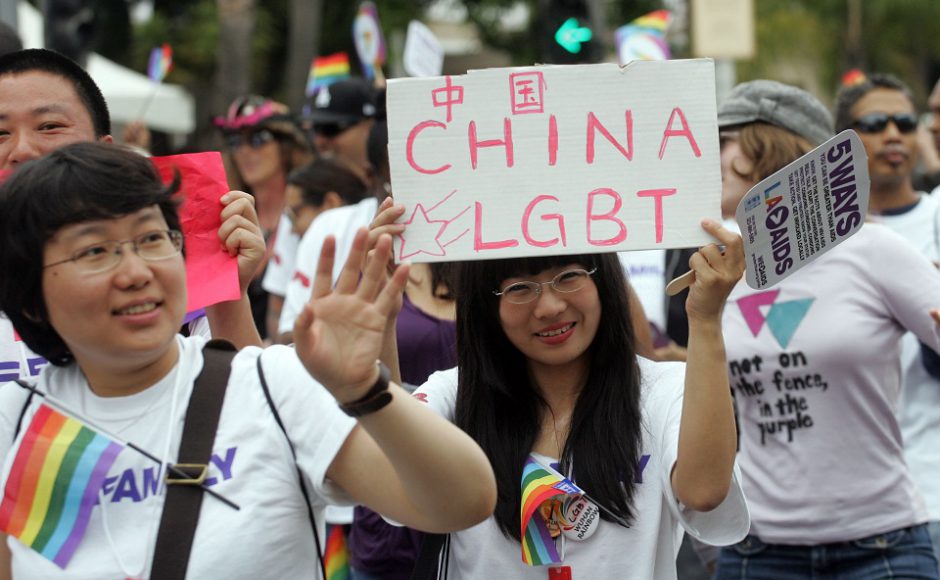“We’ve had three social media accounts being censored consecutively, but we do not want to give up yet,” an anonymous Chinese LGBTQ+ organization student leader disclosed during an interview, “even when my university counselor has notified me to halt all activities in my organization, or I may receive penalties from the school.”
In June of 2021, most official accounts of university student-run LGBTQ+ organizations were suddenly suspended overnight on WeChat. WeChat is a multi-purpose platform with 1.2 billion monthly active users that allows Chinese users to text, call, read news, pay bills, etc. Many Chinese users utilize WeChat as their primary news source and communication tool. The suspension from WeChat disabled student-run LGBTQ+ organizations from communicating with their followers, publishing educational content, and creating a safe space for local LGBTQ+ communities. The targeted organizations include those from China’s most prestigious academic institutions, such as Zhihe Society at Fudan Universities, Purple at Tsinghua University and Colorsworld at Peking University.
Most if not all of these organizations are not even associated with radical advocacy. They merely publish educational content on sexual health and legal rights, providing accessible mental and social support for college students. When students attempted to reopen their social media accounts, their requests were denied multiple times without proper explanation from WeChat. The Chinese Ministry of Foreign Affairs spokesperson, Wang Wenbin, shortly responded to foreign press correspondents that the censorship was intended to “administer law regulation.”
The crackdown has caused tremendous outrage in local LGBTQ+ communities. According to an anonymous leader who declined to be identified due to safety concerns, LGBTQ+ students are further marginalized on campus, as their only safe space for discussion on sexuality is now banned. It’s devastating news as Chinese universities do not provide any social or mental health support for the invisible LGBTQ+ students.
LGBTQ+ History in China
In China, homosexuality remained invisible in the public eye until the 1970s. During this time, homosexuals were heavily persecuted during the Cultural Revolution as the public perceived homosexuals to be disgraceful to their families and society.
The Chinese Psychiatric Association classified homosexuality as a psychiatric disorder until 2001. However, discrimination remains rampant as the public deemed homosexuality to be incompatible with traditional values. Multiple textbooks published after 2001 continued to describe homosexuality as a psychiatric disorder. As most Chinese children do not receive adequate sexual education, they primarily rely on textbooks for sexual health information. Therefore, misinformation in the textbook can be detrimental to the LGBTQ+ community. Prominent student leaders, such as Qiu Bai and Xixi, were offended by the misleading information and filed lawsuits against the publishers and China’s Ministry of Education to advocate for social change. Since then, student advocates have actively engaged in supporting the community legally, socially, and mentally.
China has made some progress in ensuring LGBTQ+ rights. Previously, LGBT couples were not allowed to inherit each other’s wealth nor sign any medical consent form. Starting in 2017, LGBTQ+ couples seeking legal protection could obtain a guardianship appointment, which permitted same-sex partners to make critical decisions on “medical and personal care, property management, maintenance of rights and interests, and death and funeral.” The establishment of legal guardianship is a good step in protecting LGBTQ+ rights. However, the application for legal guardianship is both time-consuming and complicated, as the policy was initially designed for elderly people instead of LGBT couples. Many individuals’ applications were denied as they were deemed “unnecessary appointments” by the officials.
The Chinese government often exhibits an ambivalent attitude towards LGBTQ+ communities. Today, the CCP permits the existence of local LGBTQ+ organizations and legal clinics to represent the LGBTQ community. In the meantime, CCP has largely censored homosexuality in public spaces and mass media. In 2020, Shanghai Pride, a festival established to celebrate LGBTQ+ identities, was halted due to tightening governmental interference.

Recently, China has even censored the LGBTQ storyline in the American sitcom “Friends.” Why did the government come down on student-run organizations specifically this time? What is the significance of this situation?
Analysis on Student Activism and the Crackdown
China has always had a historically well-established tradition of student activism, in which students take the lead in advocating for greater political and social change. On May 4, 1919, Chinese students protested against the government’s submission to Japanese encroachment countrywide, stimulating the birth of the Chinese Communist Party. In 1989, university students across China formed an alliance to protest for political and economic reform at Tiananmen Square, followed by a bloody military crackdown. This event is remembered as one of China’s most iconic student protests.
In recent years, as more LGBTQ+ organizations emerge on university campuses, the media has cast a spotlight on gay rights that is widely accepted among the younger generation, especially those living in urban cities such as Shanghai and Beijing. But the students’ calls for social change are also in conflict with the government’s political ideology. During the Universal Periodic Review in 2018, a process to review human rights records of UN Members, the CCP publicly announced that the government aims to protect homosexual individuals’ health rights and approves of gender affirmation surgeries (although individuals have to undergo psychiatric therapy for one year before the surgery). However, the Party also stated that homosexual marriage violates the country’s complex culture and historical values, and thus cannot be legalized.
Historically, the traditional Chinese belief is that the ultimate goal of marriage is to pass on the family’s surname. Because society normalizes the familial obligation to have offspring, young Chinese have a hard time defying societal standards. They often choose to endorse filial piety and hide sexual orientations from parents to avoid family conflicts. This is also the reason why sham marriage is rampant in China. According to statistics in 2013, approximately 14 million closeted Chinese gay men have married women to fulfill their family duty. It is evident that traditional Chinese values profoundly impact how people perceive their sexual identities and pursue marriages. Therefore, radical advocacy on same-sex marriage cannot suitably and sufficiently address the root of the concerns in the Chinese LGBTQ+ community.
In fact, nearly none of the censored student organizations focused on same-sex marriage advocacy. They primarily aim to build an inclusive community and establish legal, mental health, and career resources for university students. Why were they targeted this time? A possible explanation for why the Party targeted them is that the Party thinks the widespread student activism violates their so-called “core family values of the country” and creates a “bad influence” on the younger generation. As more young Chinese start to view homosexuality with a more positive attitude, more university students embark on LGBTQ+ advocacy. The power of student advocacy has been proven by history. As such, the CCP wants to purge any potential and unnecessary threats to their social control, especially when LGBTQ+ organizations are sometimes stigmatized to be associated with foreign forces. In fact, the government sometimes questions LGBTQ+ organizations’ loyalty to the Party and inquires about foreign funding as such business activities may be considered illegal.
The Aftermath
Safe spaces for the Chinese LGBTQ+ community are rapidly shrinking amidst the tightening social environment. The Party’s shift in attitude towards the LGBTQ+ community has further marginalized the group, especially the younger generation who are susceptible to higher rates of suicidality and mental health disorders. Therefore, the vulnerable students are in desperate need of mental and social support.
“I really want to raise more awareness of these pressing concerns,” said the interviewed anonymous leader. “The fact that we are minorities doesn’t mean our voices do not matter at all.”
Even when the majority of student-run organizations are suspended, many advocates remain active in the field. They signify a defiant spark of hope that can never be wholly extinguished.
Featured Image Source: Associated Press






Comments are closed.